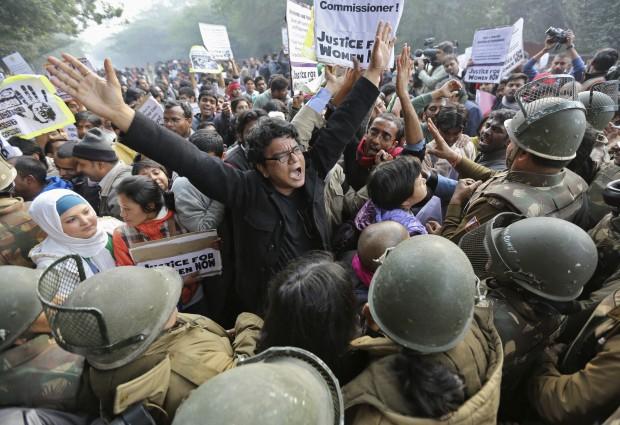#WorldGender Conversation: What is the Role of Men in the Fight for Women’s Safety?
Demonstrators shout slogans as they are surrounded by the police during a protest rally in New Delhi December 27, 2012. Several hundred people gathered in India’s capital on Thursday in a bid to rekindle mass protests over the gang rape and ferocious beating of a young woman, who was airlifted to Singapore overnight for special hospital care to save her life.
Women’s outcries for safety became more audible in the aftermath of the gang rape and subsequent death of a young woman in Delhi last December. Increasingly, male voices are entering the discussion as well.
Take Ali Shahidy, for example. He initially wrote an essay about becoming a feminist in Afghanistan under a pseudonym. As “Salim Hussaini,” he wrote candidly for the Women Under Siege website:
Growing up in Afghanistan, I had already watched my father beat my mother—but that was seen as just another part of daily life. Then the cycle of violence continued when I myself became an abuser. I began to beat my sisters and harass girls in the street. I restricted my sisters’ movements, how they looked, and who they spoke to. Afghan customs taught me that the honor of my family was more important than the physical and psychological well being of my own siblings. I was following accepted cultural norms without shame.
Confronted with his sister’s abusive marriage, however, Shahidy changed his mind:
To help my sister, I had to fight with mullahs and our elders; I had to struggle with practices, beliefs, and values that filled my life since birth… After helping Soraya, I knew I had a responsibility to fight for women’s rights in a larger way.
The World is hosting a discussion with Shahidy along with a panel of other prominent voices (see below) about the roles of men when it comes to movements for women’s safety.
Join this conversation by adding your thoughts in the comments below. Or, Tweet using the hashtag #worldgender.
On Men’s Roles in Movements to End Violence Against Women
#worldgender conversations on social media
Storified by Angilee Shah· Thu, Apr 11 2013 10:40:13
In our last discussion about gender and women’s safety we asked if the protests that followed the rape and murder of a young woman in Delhi, India last December signaled a sea change in the global movement for women’s safety. Three new panelists will join Jeb Sharp to answer your questions this week:
Ali Shahidy now works independently for women’s rights and safety by raising the issue using his real name. He hosts seminars and talks to men in Kabul about why culture in Afghanistan should change. He started a Facebook page to highlight successful Afghan women as role models.
Richard Tolman is a professor of social work at the University of Michigan. He studies the effectiveness of interventions into violent and abusive behavior. He queries aggressive masculinity and how gender roles can negatively affect both men and women.
Sunil Bhatia is a Media scholar at Connecticut College. He was in Delhi in January and saw women on the front lines of protests. Bhatia teaches about gender representations in media and writes about the complexities of representing others. In one essay at The Feminist Wire, Bhatia examines Nicholas Kristof’s coverage of violence against women.
How have men helped in the fight for women’s safety? Should there be any limits to men’s participation in movements meant to empower women? Where do men’s representations of women’s movements succeed and where do they fall short? Do organizations that focus on men draw resources from those that focus on women? Or, are efforts to demand women’s safety and rights benefiting from, or often seeking more men’s involvement?
